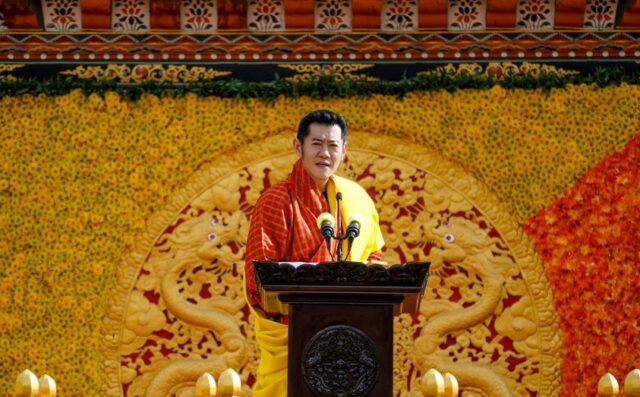India and Bhutan reinforced their longstanding partnership with the commissioning of the 1,020 MW Punatsangchhu-II Hydroelectric Project, inaugurated jointly by Prime Minister Narendra Modi and His Majesty King Jigme Khesar Namgyel Wangchuck in Thimphu.
The ceremony was held in the presence of the sacred Holy Relics of Lord Buddha and marked another step forward in cooperation in the hydro-power sector, which remains the foundation of their bilateral engagement.
Fully funded by India through a mix of grants and soft loans, Punatsangchhu-II raises Bhutan’s total installed capacity by 40 percent. The electricity generated will support Bhutan’s domestic demand and be exported to India, contributing to regional energy security and development in India’s northeastern states.
The two governments also decided to resume construction on the 1,200 MW Punatsangchhu-I Hydroelectric Project, underscoring their continued commitment to collaborative energy generation.
During the visit, both sides signed MoUs to strengthen cooperation across sectors:
- Renewable Energy Cooperation, covering solar, wind, biomass, green hydrogen, and energy storage, as well as capacity building and technology transfer.
- Health and Medicine, providing for collaboration in drugs, diagnostics, maternal and child health, traditional medicine, disease prevention, telemedicine, and research.
- Mental Health, between Bhutan’s PEMA Secretariat and India’s NIMHANS, to develop in-country training and research programs for mental health professionals.
India announced a Rs 4,000 crore line of credit, allocation of land in Varanasi for a Bhutanese temple and guest house, and the establishment of an immigration check post at Hatisar across Gelephu to improve cross-border mobility.
Ahead of the visit, Bhutanese Prime Minister Tshering Tobgay noted that the ongoing Global Peace Prayer Festival, led by the King, was being supported by the Government of India. During the visit, His Majesty offered condolences and led prayers for the victims of the terror attack in Delhi.
Prime Minister Modi expressed gratitude for Bhutan’s solidarity, stating that India would always remember the compassion shown by the Bhutanese people at a time of national grief.
India and Bhutan have developed five major hydroelectric projects to date including Chukha (336 MW), Kurichhu (60 MW), Tala (1,020 MW), Mangdechhu (720 MW), and Punatsangchhu-II (1,020 MW), with Punatsangchhu-I (1,200 MW) under construction.
A joint vision for future energy partnership, agreed in 2024, provides a framework for further collaboration in hydro-power and renewable sectors, including participation by Indian private companies.
India continues to facilitate market access for Bhutan’s electricity exports through its power exchanges, while also supplying power to Bhutan during lean seasons.
Connectivity was another area of progress during the visit. Under a new intergovernmental MoU signed in September 2025, two cross-border rail links, Kokrajhar–Gelephu (69 km) and Banarhat–Samtse (20 km), will be developed at a combined cost of Rs 4,033 crore.
These will complement other recent initiatives, including the inauguration of an Immigration Check Post at Darranga, Assam (November 2024) and the Jogighopa Inland Waterway Terminal (January 2025), aimed at strengthening trade and transit networks.
The two countries had jointly launched the India–Bhutan SAT in November 2022 and inaugurated the South Asia Satellite Ground Station in Thimphu in 2019. In the fintech domain, Bhutan became the first country to adopt India’s BHIM-UPI system (2021) and implement the RuPay Card scheme (launched in 2019 and expanded in 2020), promoting seamless cross-border digital transactions.
India has also supported Bhutan’s Gyalsung National Service Programme, extending Rs 200 crore in grants and a Rs 1,500 crore concessional loan for academy infrastructure. In addition, India reaffirmed its support for the Gelephu Mindfulness City project, a royal initiative envisioned as a service-sector-led special administrative region to generate sustainable employment and regional connectivity.
India continues to be Bhutan’s largest trading partner, accounting for nearly 80 percent of Bhutan’s total trade. In 2024, bilateral trade stood at Rs 12,669 crore, with India’s exports to Bhutan amounting to Rs 9,538 crore and imports from Bhutan at Rs 3,131 crore. India provides Bhutan duty-free transit and exemption from export restrictions on essential commodities. A recent B2B agreement on fertilizer supply further strengthened agricultural cooperation.
Prime Minister Modi’s decision to proceed with the Bhutan visit despite the Delhi attack conveyed India’s steadfast commitment to its closest Himalayan partner and Neighbourhood First policy.





